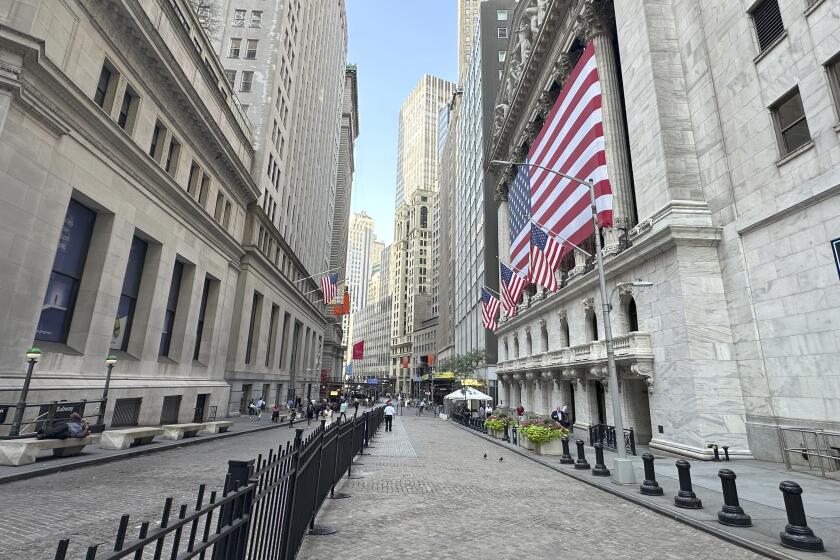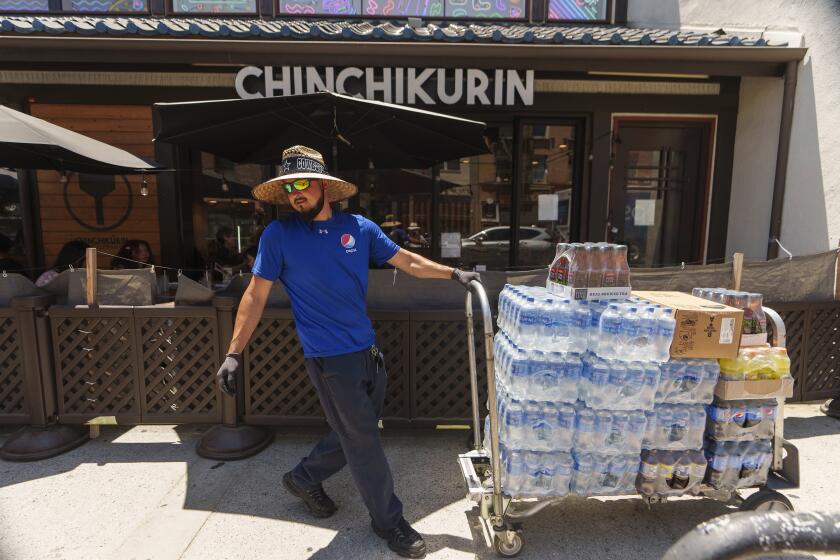Lawsuits, Ordinances Put Industry on Notice
Business has been good for lawn care services. The industry reports a 25% annual growth rate nationwide. But the companies have been criticized recently for the chemicals they use.
Last month, a class-action suit was filed against ChemLawn Service Co. in U. S. District Court in Philadelphia on behalf of about 50 families from Texas, Maryland, Illinois, New York and Florida. The suit alleges a wide range of illnesses resulting from exposure to chemicals used by the company on either the plaintiff’s lawns or those of their neighbors, said Baltimore attorney Robert Weltchek, who is handling the case. Physical ailments listed in the suit include nausea, vomiting, rashes, high fever, disorientation, impairment of muscular coordination, respiratory distress and convulsions.
A 1983 lawsuit filed against an herbicide manufacturer in Arlington County, Va., Circuit Court, contends that Lt. George M. Prior, a Navy navigator, died because of exposure to Daconil, a fungicide commonly used by lawn care companies and golf courses to prevent brown spots on lawns.
Prior became ill while golfing at the Army Navy Country Club in Arlington. He developed blisters over 80% of his body and, 10 days later, died when his kidney, lung, liver and heart failed. An autopsy concluded that Prior’s organs failed as a result of by toxic epidermal necrolysis, a burning of the skin caused by exposure to toxic chemicals. His widow is seeking $20 million from the country club and Daconil’s manufacturer, Diamond Shamrock Corp.
Wauconda, Ill., Lakewood, Ohio, and Milford, Mich. have enacted municipal ordinances requiring, among other things, that lawn care services register with the city health department, post warnings in yards that have been sprayed that day and notify owners of abutting properties before treatment is applied. The lawn care industry is challenging several of these ordinances in court.
In this state, lawn care services, or anyone wishing to spray pesticides, must register with the state Department of Food and Agriculture. There are no California cities with stricter regulations, said Mac Takeda, a senior pesticide-use specialist with the state.
“I really believe that what we do is safe,” said Steve Griggs, a regional technical manager for ChemLawn, the industry’s largest company. “Everything that we apply you can go buy at K mart. And we apply it according to the label.”
sh Component of Agent Orange
Lawn care services commonly use pesticides like Dursban, Diazinon and 2,4-D, which is one of two chemical components in the Vietnam defoliant Agent Orange. The companies stress that they spray such chemicals only in highly diluted solutions. ChemLawn officials contend that a customer would have to eat 300 cups of grass clippings their company has treated to equal the toxicity of one cup of coffee.
Besides, Griggs said, lawn care services provide a measure of public safety by saving their clients the danger of handling, diluting and storing such chemicals.
“It gets the possibility of a poisoning out of the home,” Griggs said.
However, officials at the National Coalition Against the Misuse of Pesticides in Washington are warning consumers away from chemical lawn care services.
sh Long-Term Effects
“People should be very concerned,” said Diane Baxter, a staff scientist with the coalition. “Many of these chemicals have not been fully tested, many are already known to be harmful to animals.
“It’s very true that dilution mitigates the acute hazards. But there are other factors to be taken into account,” Baxter said. “That argument doesn’t take into account long-term chronic effects. Some people are undeniably sensitive.”
Several of the plaintiffs involved in the Philadelphia class-action suit said they were exposed when wind carried the chemical spray from a neighbor’s yard through open windows in their houses. In the last three years, the coalition has received about 20 reports of illnesses caused by exposure to lawn care treatments. However, no such illnesses have been reported in Los Angeles County, state officials said.
sh No Report of Illness
“We investigate all pesticide-related illnesses,” said Richard Knight, supervisor of the pesticide and pest management division of the county agricultural commissioner’s office. “We have had no investigations of illnesses resulting from pesticides used in lawn care.”
Since 1982, there have been 35 reported illnesses connected with lawn-chemical use statewide, according to the Department of Food and Agriculture. Both professionals and homeowners were affected.
“If the customer doesn’t want us to spray pesticides, we won’t,” said Bob Cohen, owner of the Green Scene, a Tarzana lawn care company. “What you don’t use is just as important as what you do use.”
The Green Scene, like ChemLawn and other lawn care services, advises its clients to stay off their lawns for up to three hours after chemicals have been sprayed.
Coalition officials say they believe there are alternatives to spraying chemicals on the front lawn, whether they are applied by the homeowner or a professional service. Baxter said residents can use organic fertilizers and pay more attention to watering. When a lawn is plagued by disease, she advised, reseed with a variety of disease-resistant grass suitable to the particular climate.
“There are ways to achieve a good-looking lawn without dousing your lawn with chemicals,” she said.
More to Read
Inside the business of entertainment
The Wide Shot brings you news, analysis and insights on everything from streaming wars to production — and what it all means for the future.
You may occasionally receive promotional content from the Los Angeles Times.







